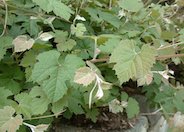
Common name:California Wild Grape
Botanical name:Vitis californica
The California Wild Grape is a woody deciduous vine that with round large leaves. The flowers are in small fragrant blooms and berry clusters appear in the summer. This vine has a sprawling, climbing growth habit. The California wild Grape is native to California and is drought tolerant. It will cover up fences nicely. Grapes are ornamental.
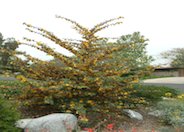
Common name:Flannel Bush, Fremontia cv.
Botanical name:Fremontodendron 'California Glory'
'California Glory' is an open and spreading evergreen shrub 10'-20' in height with many yellow flowers blooming in spring. It needs good drainage and little summer water. It is a native plant to California as the name suggests and it is drought tolerant. -Cornflower Farms
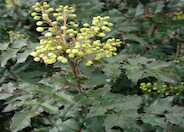
Common name:Oregon Grape
Botanical name:Mahonia aquifolium
Exhibiting erect growth, this evergreen shrub grows to a height of 6'. The leaves are 4"-10" long, with 5-9 very spiny-toothed, oval leaflets that are 1.5" in length.
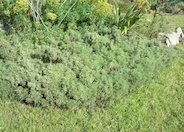
Common name:California Sagebrush
Botanical name:Artemisia californica
The California sagebrush is an evergreen medium sized, gray green aromatic shrub. The foliage has wispy soft texture.This shrub is native to CA, is drought tolerant, and attracts butterflies. This is a highly combustible plant. ~Cornflower Farms
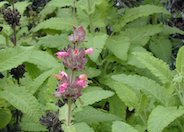
Common name:Hummingbird Sage, Pitcher Sage
Botanical name:Salvia spathacea
The extravagant leaves of this small clumping sage emit a perfectly sweet fragrance, which attracts hummingbirds. In the spring, the reddish pink flowering spikes become a deep fuchsia. It is a great plant for dry shade.
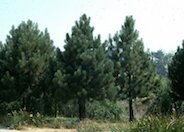
Common name:Coulter Pine, Bigcone Pine
Botanical name:Pinus coulteri
The Pinus coulteri is a tree used mainly for reforestation. However, the symmetrical, open shape of this tree with lower branches that persist and spread widely make it an excellent choice for gardens with plenty of space. Pines are highly combustible plants.
| Designer: Rancho Santa Ana Bot. Garden | California Grape Gazebo |
Photographer: GardenSoft |
Soils and Compost:
Maintain a two to four inch layer of mulch on the soil surface to reduce weeds, infiltrate rain water, and reduce compaction.
Water Saving Tip:
Mulching and adding compost to soil can minimize evaporation and help soil absorb and store water.
Integrated Pest Management:
Remove irrigation water and fertilizer from areas where you don't want weeds to grow.

